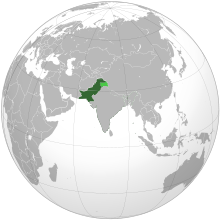Nuclear Pakistan: At Diplomacy’s Mercy – Analysis
By IPCS
By Alankrita Sinha and Tanvi Kulkarni
The recent statement by Pakistan’s acting Permanent Representative Raza Bashir Tarar on the ‘Report to the IAEA’ at the 66th session of the UNGA offers valuable insight into the conduct of international diplomacy. There are two main issues pertaining to this case. The first deals with the diplomatic language employed, and the second, with correspondence between diplomatic statements and ground realities. The following commentary deliberates on Pakistan’s aforementioned statement made at the UNGA and delves into the language used as well as the ground reality in Pakistan, in an attempt to understand the efficacy of Pakistan’s nuclear diplomacy.

If one has to make an in depth analysis of Mr Tarar’s official statement, at least two elements could be picked up for the purpose of understanding their nuanced use of diplomatic language. First is the reference to the IAEA as the ‘unique authority’ to coordinate nuclear security-related policies and operational activities. Collaterally, other initiatives have been identified as those that are ‘counter-productive’ and cause ‘duplication’ of efforts. Compare and contrast this against the increasing role being played by the Nuclear Suppliers Group (NSG) in regulating nuclear commerce in the world. In March this year, the NSG’s objections to China’s export of Chashma 3 and 4 nuclear reactors to Pakistan were over-ridden by IAEA’s unanimous approval to a safeguards agreement for the two reactors. Clearly, Pakistan now wants to associate a greater sense of legitimacy to the IAEA; the NSG objections had caused significant disquiet for Pakistan. It is with this sense of triumph that Pakistan asserts that it would be a member of the NSG only if the group accepted its nuclear weapons status and ‘principled position’ on the NPT.
The grand-fathered Chashma 3 and 4 nuclear reactors have recently become a cause for concern in terms of reactor-safety. The two reactors use China’s domestic second generation design technology. After the Fukushima disaster, China itself has moved to a third generation technology (CAP 1400 nuclear reactors based on Westinghouse Elecric Co’s AP 1000 PWR designs) and also has plans to approach foreign vendors for safer reactor designs and technology. Further import of reactors from China to Pakistan would then require more convincing arguments than the grandfather clause. Undermining the role of the NSG would also make Pakistani diplomacy run into potential problems.
The second element of the Pakistani statement concerns the changing nature of Pakistani discourse on nuclear energy, policies and regimes in international forums after the Indo-US nuclear deal. Popular discourse calls for nuclear regimes and policies to be universal and non-discriminatory. Pakistan’s usage of phrases like ‘impartial’ alludes to the Indo-US nuclear deal, and inherent in this language is the accusation that the international nuclear community, particularly the US, has been partial to India and has played favourites. At the same time, the Sino-Pak nuclear cooperation has been maligned as a ‘proliferation’ agenda. While Pakistani diplomacy does a decent job in playing the victim, neither this nor the discourse of impartiality can conceal ground realities for very long.
From diplomatic manoeuvres to ground realities, is it any surprise that all Pakistani statements constantly reiterate the safety and security of their nuclear materials and facilities? Perhaps not. What is noteworthy, however, is the overarching concern of the international community in this matter, even though Pakistan has in place a stringent mechanism to ensure nuclear safety and security. In fact, to an observer, it is interesting to note the manner in which Pakistan has shifted its attention from military to civil nuclear issues in the last decade. The National Command Authority (NCA) which was established in 1999 to oversee Pakistan’s nuclear weapons programme had only a role of secondary importance, reserved for export controls and safety and security issues, till 2001. This seemed to change after the Pakistan Nuclear Regulatory Authority (PNRA) was established in 2001 with a PNRA Ordinance to ensure proper licensing, regulation, and safety of all radiological substances.
Moreover, after the Export Control Act of 2004, Pakistan’s nuclear export control which was previously overseen by statutory regulatory orders, ordinances and acts regulated under the Ministry of Commerce were now put under the aegis of the PNRA and subject to rigorous control mechanisms. Why then, it is natural to ask, is there an international hue and cry about Pakistan’s nuclear safety and security? A probable answer points towards the underlying fault-lines which have failed to be concealed by diplomatic statements. These include four major issues – the growing prominence of insider threats, frequent and sudden regime changes, clandestine nuclearisation, and increasing radicalization. None of these fault-lines can be effectively masked by diplomatic assurances to the contrary.
Diplomacy is the art of selective projection which is exploited by all countries which form the international society. However, if there exists a considerable rift between projection and reality, how long can diplomatic manoeuvring sustain international favour? This question is imperative in the case of nuclear Pakistan. If one looks at such Pakistani statements in isolation, they might even succeed in painting a rosier picture than what might actually be the case. Although this is how diplomacy is used by every other country, in the case of Pakistan, the loss of control over the factors mentioned above leaves it to the mercy of diplomatic manoeuvring rather than using diplomacy as a tool to its advantage. The disjoint in projection and reality is too visible and glaring for its nuclear diplomacy to sustain over time.
Alankrita Sinha and Tanvi Kulkarni
Research Officers, IPCS
email: [email protected], [email protected]
